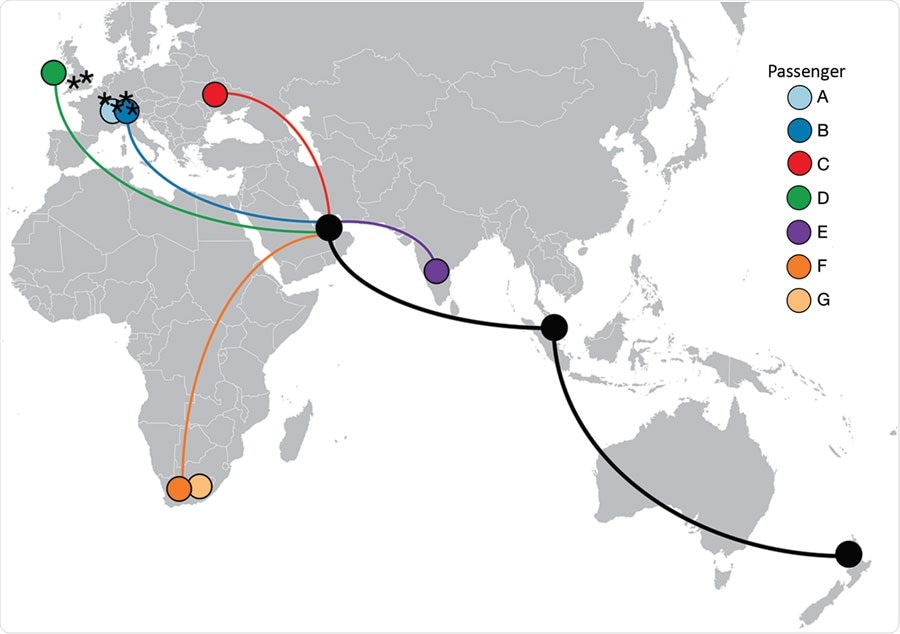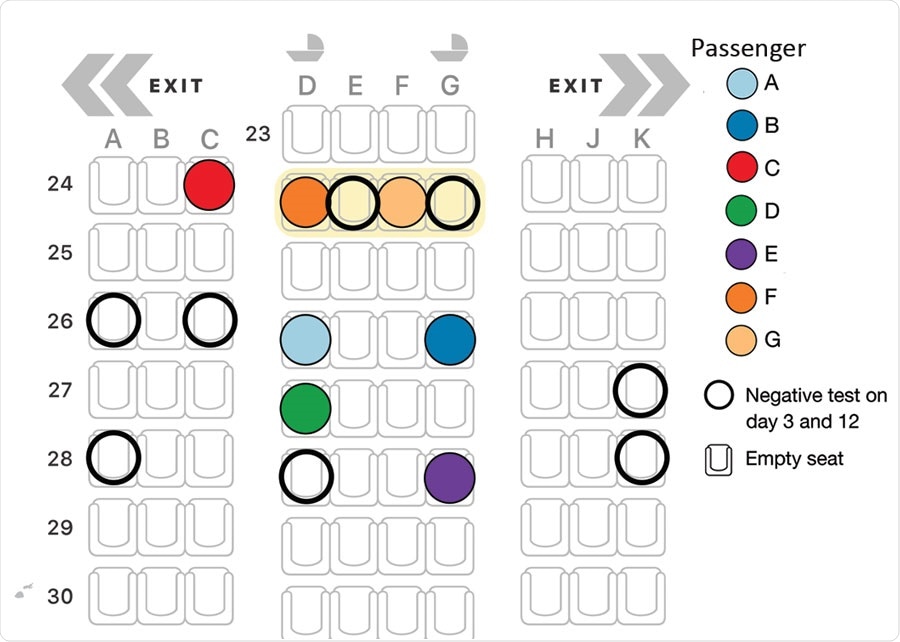Since the first coronavirus wave, New Zealand has had an exceptional response to the pandemic with a system of managed isolation and quarantine for people entering the country. The restrictions also expanded to include testing people for COVID-19 on the third and twelfth day of quarantine.
The world currently has over 114 million global cases and over 2.53 million deaths. New Zealand has some of the lowest cases around the globe reporting approximately 2,378 cases and 26 deaths.
The study “Genomic Evidence of In-Flight Transmission of SARS-CoV-2 Despite Predeparture Testing” may help scientists and public health officials further understand the exact risk of coronavirus transmission on long flights. The international research team, led by Tara Swadi from the New Zealand Ministry of Health, writes:
“Combined, these data present a likely scenario of >4 SARS-CoV-2 transmission events during a long-haul flight from Dubai to Auckland. These transmission events occurred despite the reported in-flight use of masks and gloves. Further transmission between travel companions then occurred after the flight, in a MIQ facility.”
Details on COVID flight transmission between seven passengers
The team gathered case data from a coronavirus outbreak on a plane on September 29, 2020, arriving from Dubai, United Arab Emirates, to Auckland, New Zealand. During the 14-day managed isolation and quarantine, 7 people tested positive for SARS-CoV-2. The researchers collected data from the Ministry of Health collection for epidemic surveillance.
All 7 passengers infected with SARS-CoV-2 came from 5 different countries, and 5 were tested negative on one layover stop in Malaysia. All 7 passengers were seated 4 rows away from each other during an 18-hour flight. During the flight and before leaving the Dubai airport, mask-wearing was optional. Five of the 7 infected passengers wore masks and gloves while on the plane, while 2 did not.

ountries of travel origins for 7 passengers who tested positive for severe acute respiratory syndrome coronavirus 2 infection after traveling on the same flight (EK448) from Dubai, United Arab Emirates, to Auckland, New Zealand, with a refueling stop in Kuala Lumpur, Malaysia, on September 29, 2020. Asterisks indicate where 6 other genetically identical genomes have been reported.
Genomic SARS-CoV-2 data
The researchers performed whole-genome sequencing on the test samples of the 7 patients positive for SARS-CoV-2. They found the sequences were genetically identical, and with the exception of one mutation from one passenger, all SARS-CoV-2 samples came from the B.1 lineage.
The researchers then compared the 7 genomes to the international database (GISAID) also found 6 identical genomes, with 4 coming from Switzerland and 2 from the United Kingdom.
Tracking down the source
Based on the results, the team predicts 2 passengers were the source of infection. These passengers had traveled together from Switzerland and had tested negative three days before leaving the country. One of these passengers was the first to report symptoms of COVID-19 infection on October 1, with a positive SARS-CoV-2 test result the following day.
In addition, they predict 4 passengers became infected during the flight, and one passenger became infected while in mandatory quarantine.

Seating arrangement (Boeing 777–300ER) for 7 passengers who tested positive for severe acute respiratory syndrome coronavirus 2 (SARS-CoV-2) infection on flight EK448 from Dubai, United Arab Emirates, to Auckland, New Zealand, with a refueling stop in Kuala Lumpur, Malaysia, on September 29, 2020. Passengers F and G interchanged seats within row 24. Open circles represent nearby passengers who were negative for SARS-CoV-2 on days 3 and 12 while in managed isolation and quarantine. All other seats shown remained empty.
Limitations in genomic surveillance pose difficulty in finding the source of transmission
However, the researchers suggest limited global sequencing data makes it hard to narrow down the source of the SARS-CoV-2 outbreak on the plane.
“These findings were consistent with virus introduction onto the airplane from Switzerland by passenger A, B, or both. Nevertheless, accurately identifying the source of this outbreak may be impeded by substantial biases and gaps in global sequencing data; hence, we cannot explicitly exclude passenger C as the source.”
There’s also the possibility of an alternative exposure event, such as SARS-CoV-2 transmission at the Dubai airport before boarding. Although, they suggest the close seating makes in-flight transmission a likely option.
“Although not definitive, these findings underscore the value of considering all international passengers arriving in New Zealand as being potentially infected with SARS-CoV-2, even if pre-departure testing was undertaken, social distancing and spacing were followed, and personal protective equipment was used in-flight.”